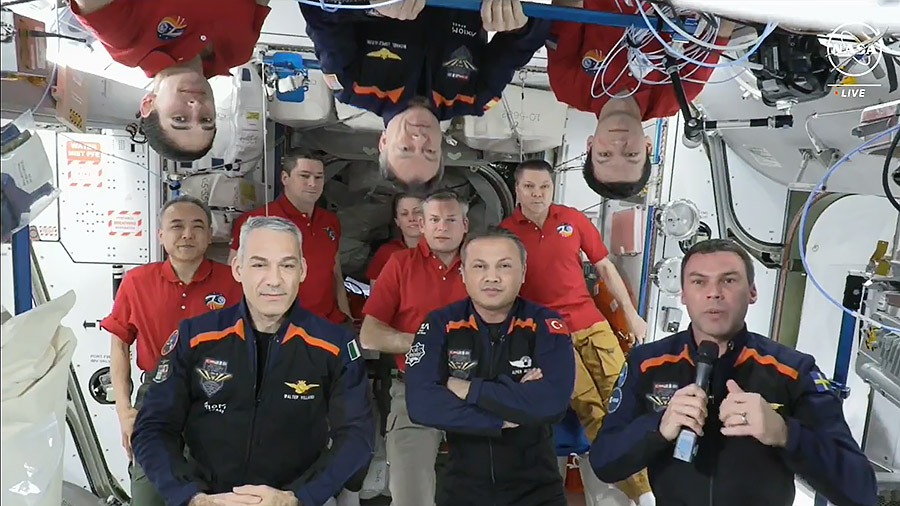Ax-3 astronauts depart ISS in SpaceX Dragon capsule for splashdown on Feb. 9 (video)
The four astronauts of the private Ax-3 mission departed the International Space Station in their SpaceX Dragon capsule on Wednesday (Feb. 7) after several weather delays.
Ax-3's Crew Dragon "Freedom" from SpaceX left the International Space Station (ISS) at 9:20 a.m. EST for a scheduled splashdown on Friday (Feb. 9) at 8:30 a.m. EST (1330 GMT). The undocking event was carried live on NASA Television.
"We hope you guys had a wonderful time on the station, and we're looking forward to seeing your smiling faces in person," came the callout from Mission Control around seven minutes after Dragon was unhooked from the ISS over the south Pacific Ocean, west of Ecuador.
Dragon had been scheduled to undock from the orbiting lab Saturday (Feb. 3) at 6:05 a.m. EST (1105 GMT). Bad weather in Freedom's splashdown zone — the ocean off the Florida coast — nixed that plan, along with possible Monday (Feb. 5) or Tuesday (Feb. 6) departures.
Related: Live updates from the Ax-3 private astronaut mission
Ax-3 is the third crewed mission to the International Space Station (ISS) organized by Houston-based company Axiom Space, after similar efforts in April 2022 and May 2023.
Ax-3 launched atop a SpaceX Falcon 9 rocket from NASA's Kennedy Space Center on Jan. 18, sending four crewmembers aloft. They are Ax-3 commander Michael López-Alegría, a former NASA astronaut who's now Axiom Space's chief astronaut; pilot Walter Villadei, a colonel in the Italian Air Force; mission specialist Alper Gezeravcı, Turkey's first-ever astronaut; and mission specialist Marcus Wandt, a reserve astronaut with the European Space Agency.
Breaking space news, the latest updates on rocket launches, skywatching events and more!
López-Alegría holds dual U.S.-Spanish citizenship, so Axiom Space bills Ax-3 as the first all-European crewed mission to the ISS.
Ax-3 is the first orbital mission for Villadei, Gezeravcı and Wandt (though Villadei did go to suborbital space with Virgin Galactic last year). López-Alegría, by contrast, is an old hand at this; Ax-3 is his sixth orbital trip. One of his previous missions was Ax-1 in 2022, so he's the first person ever to fly on a Dragon capsule twice.
The Ax-3 quartet have been performing more than 30 different scientific experiments during their time in orbit, including work in physics and space medicine. Some of their research will help Axiom Space improve its training programs ahead of future missions, company representatives have said.
While Ax-3 is winding down, SpaceX is gearing up for another astronaut flight: The Crew-8 mission for NASA, which will send four spaceflyers to the ISS for a roughly six-month stay. Crew-8 is currently targeted to lift off on Feb. 22.
Editor's note: This story was updated at 8 a.m. EST on Feb. 7 with a 15-minute departure delay, and at 9:30 a.m. with news of the departure and splashdown timing.

Michael Wall is a Senior Space Writer with Space.com and joined the team in 2010. He primarily covers exoplanets, spaceflight and military space, but has been known to dabble in the space art beat. His book about the search for alien life, "Out There," was published on Nov. 13, 2018. Before becoming a science writer, Michael worked as a herpetologist and wildlife biologist. He has a Ph.D. in evolutionary biology from the University of Sydney, Australia, a bachelor's degree from the University of Arizona, and a graduate certificate in science writing from the University of California, Santa Cruz. To find out what his latest project is, you can follow Michael on Twitter.

